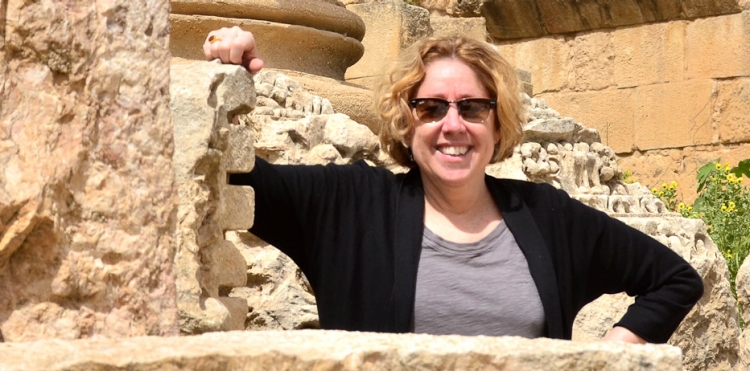
By
Professor Robin Fleming, chair of the History Department and a faculty member at Boston College since 1989, has been named a 2013 MacArthur Fellow, the University’s first recipient.
Fleming, whose teaching and research areas of interest include early medieval Britain and material culture, was among 24 Americans honored with the so-called “Genius Awards” issued annually by the John D. and Catherine T. MacArthur Foundation.
The MacArthur Fellowships are awarded to talented individuals in a variety of fields who have shown exceptional originality in and dedication to their creative pursuits. Fellows, who are nominated anonymously by leaders within their respective disciplines, receive $625,000 stipends over five years.
“Obviously, although still stunned by the news, I am thrilled to receive this award,” said Fleming last week. “I am a member of such a great department at BC, one that is full of really good historians doing exceptionally interesting work. I hope that the MacArthur Fellowship brings attention to my colleagues, as well as our fabulous graduate and undergraduate students. I also hope that it puts the spotlight on the more interdisciplinary work in which many of us across the University are now engaged through the McMullen Museum of Art and the Institute for the Liberal Arts, among other places.
“I look forward to continuing cross-disciplinary collaboration with colleagues at BC and abroad, and am thrilled by the more interdisciplinary curriculum we are now developing for our undergraduates. Every morning when I wake up, I can’t wait to get out of bed and investigate the questions that animate my research, and I’m eager to instill that excitement in our students.”
College and Graduate School of Arts and Sciences Dean David Quigley praised the selection of Fleming as a fitting choice for this most distinguished award.
“Robin Fleming is a colleague whose work I have admired since I joined the History Department as her junior colleague 15 years ago,” said Quigley. “Many of us across campus continue to marvel at the ways in which she manages to balance her remarkable scholarship, her extraordinary teaching and her passionate commitment to training the next generation of medievalists. Her most recent book, Britain after Rome, is a beautiful work of historical imagination, one that forces the reader to grapple with the hard realities of our distant past.”
Added Interim Provost and Dean of Faculties Joseph Quinn, “This is great news for Robin, for our terrific History Department, and for Boston College. Robin is a superb scholar, writing about eras in which hard evidence is tough to find. Her article titled ‘Bones for Historians: Putting the Body Back in Biography,’ about all that can be learned about individuals and societies from thousand-year-old bones, is one of the neatest papers I have ever read. It is amazing to see how much trained experts like Robin can glean from so little. I am thrilled to see her years of work so prominently and appropriately recognized.”
In its announcement, the MacArthur Foundation states that the goal of the MacArthur Fellowship is “to support creative people and effective institutions committed to building a more just, verdant, and peaceful world.” In addition to selecting the MacArthur Fellows, the foundation works to defend human rights, advance global conservation and security, and improve understanding of how technology is affecting children and society.
At Boston College, Fleming teaches courses on late-Roman and early medieval history; the Vikings; ancient and medieval historical writing; and material culture. She has written on the history of Viking, Anglo-Saxon and Anglo-Norman England; early medieval material culture and osteoarchaeology; historical writing in the early Middle Ages; English law before the Common Law; and 19th-century medievalism.
Her 2011 book, Britain after Rome: The Fall and Rise, 400-1070, investigates Britain in the century before and after Rome’s fall, in an attempt to determine how Roman ways of life, identity, burial and status-making changed once the Roman economy collapsed and connections to the wider Roman world began to unravel.
Fleming has received grants or fellowships from the National Endowment for the Humanities, Harvard Society of Fellows, Bunting Institute, Institute for Advanced Study at Princeton University, Radcliffe Institute of Advanced Studies at Harvard University, and Guggenheim Foundation. She is a Fellow of the Massachusetts Historical Society, The Royal Historical Society, and the London Society of Antiquaries.
Fleming is a graduate of the University of California-Santa Barbara, where she received her bachelor’s degree and doctorate in history.



